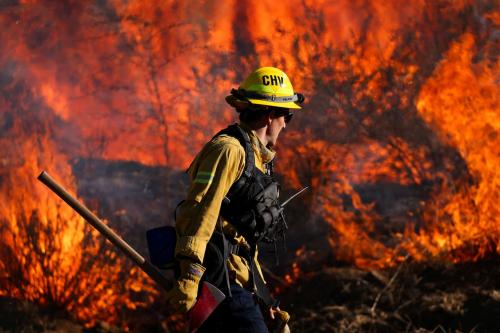Once again our television screens are filled with images of parents looking desperately for missing children, of family members digging through the rubble of their homes searching for relatives, of chaos and fear in the streets. This time the disaster is the earthquake in Haiti.
In the face of such compelling images, the immediate response is to send money, food, medicines, relief workers, sniffer dogs. Certainly the international community must respond generously to Haiti, the poorest country in this hemisphere and a place that has suffered from so many natural and manmade disasters in recent years. And all signs are that the international community will respond effectively and quickly. The aid machinery works well. But while the aid is coming in quickly and the world is responding to Haiti’s devastation, we must be careful that the victims of the disaster aren’t further victimized by the response. As one Indian official put it after the 2004 tsunami, “there is the disaster after the disaster.”
People don’t lose their human rights in an earthquake or a hurricane. They may be vulnerable, traumatized, and have many needs. But they also have rights. People have the right to be protected against violence, the right to receive life-saving assistance, the right to be informed about their situation. They have the right to shelter and safe water and medical care. They have the right to be reunited with family members and the right to have the mortal remains of their relatives treated with respect and dignity.
The primary duty and responsibility to protect and assist those affected by natural disasters lies with national authorities. When the capacity of governments is overwhelmed, it is the responsibility of the international community to respond. Too often the disaster responders—whether national government officials or international agencies—simply don’t think in terms of the rights of the victims.
Evaluations carried out in the aftermath of the 2004 tsunami revealed that human-rights violations were widespread in the disaster response itself, including widespread discrimination in the provision of assistance, unequal access to aid, sexual and gender-based violence, and forced relocation of groups of people. Often these human-rights violations aren’t intended or planned, but result from insufficient resources and capacities. More often they occur because those in charge of disaster response are too busy distributing aid to think about the human-rights implications of their actions.
Certainly the U.S. response to Katrina was flawed by inadequate attention to the rights of the poor, African Americans, the elderly, and the immigrants in planning for disaster response. “Human rights are as much a part of the lives of the people we are called upon to assist and to protect as are their needs for food and shelter,” wrote then-Emergency Relief Coordinator Jan Egeland and Walter Kälin, representative of the secretary-general on the human rights of internally displaced persons in introducing the U.N.’s Operational Guidelines on Human Rights and Natural Disasters.
These guidelines offer practical guidance. When the situation is chaotic and there are many unmet needs, it is helpful to set priorities: First, rights related to physical security (e.g. to be protected against violence) must be upheld, closely followed by rights related to the basic necessities of life (e.g. water). A third priority are economic, social and cultural rights (e.g. education), and then other civil and political protection needs (e.g. freedom of speech, political participation.) During emergency situations—such as the present situation in Haiti, the first two groups of rights are most important. But as time goes on, the other groups of rights become more important. All four groups of rights need to be fully respected to ensure protection of the human rights of those affected by natural disasters.
In Haiti, this means that security on the streets, efforts to rescue those whose lives are at risk, and provision of life-saving assistance must be the priority of those responding today and in the coming days. But protecting the rights of those affected by the earthquake won’t end when everyone has shelter and medical care. By focusing on the human rights of those affected by natural disasters, there is the potential for moving beyond immediate disaster response to taking actions that can mitigate the human costs of even terrible disasters, such as yesterday’s earthquake in Haiti.
This op-ed was originally published in The Daily Beast and can be viewed through the following link: http://www.thedailybeast.com/blogs-and-stories/2010-01-13/haitis-charity-crisis/



Commentary
Op-edRights Amid the Rubble: Human Rights for Haiti’s Quake Victims
January 13, 2010